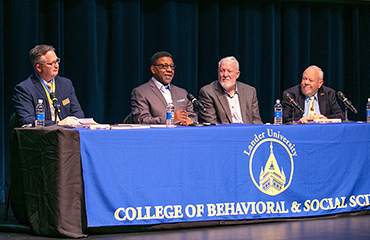
Lander University observed the 10th anniversary of the Dr. Benjamin E. Mays Historical Preservation Site in Greenwood with a panel discussion featuring three of “the foremost chroniclers” of the life of the well-known civil rights leader.
The event, held on Friday, Nov. 5, in the Josephine B. Abney Cultural Center Auditorium, was followed by a program at the Mays Historic Site on North Hospital Street on Saturday, Nov. 6, and a worship service at Mays’s childhood church near Epworth on Sunday, Nov. 7.
Panelists for Friday’s event included Randal Maurice Jelks, professor of American, African and African-American studies at the University of Kansas; John Herbert Roper, teaching associate in history at Coastal Carolina University; and Orville Vernon Burton, Judge Matthew J. Perry distinguished chair in history and professor of Pan-African studies at Clemson University.
A “seminal moment” in Mays’s life was witnessing his father having to beg for his life when confronted by a lynching party when Mays was four, according to Jelks, author of “Benjamin Elijah Mays, Schoolmaster of the Movement: A Biography,” published by the University of North Carolina Press.
Mays rose above his hardscrabble upbringing through education and travel, Jelks said. Meeting people like Mahatma Gandhi in 1936 gave him “a comparative lens with which to look at his own village.” Seeing the Nazis mobilize for war in Germany made him realize that “racism is a global threat.”
Mays “was the most idealistic of people, and yet also the most practical,” said Roper, whose works include “The Magnificent Mays: A Biography of Benjamin Elijah Mays,” published by the University of South Carolina Press.
“He knew that only a militant pacifism — which he taught most prominently to Dr. Martin Luther King, Jr. — could possibly defeat” anti-black racism
Mays spoke at the funeral of “his intellectual son” in 1968, after King was assassinated.
“Lincoln’s Gettysburg address was good, but I believe that Mays’s speech about King was better,” Roper said.
A native of Ninety Six, as Mays was, Burton met Mays when he was a student at Furman, and went on to edit his autobiography, “Born to Rebel,” published by the University of Georgia Press.
Mays rebelled against “a segregated and unfair and unChristian society,” according to Burton, and his efforts were not in vain.
“I just wish he could know how much changed through his life of rebellion. He changed our community, our state, our nation for the better,” said Burton.
The evening included two special presentations. Rev. Christopher Thomas, director of the Mays Historic Site, was recognized as one of four South Carolinians receiving this year’s Fresh Voices in the Humanities Award, and Professor of History Dr. Kevin Witherspoon was formally installed as the inaugural Dr. Benjamin E. Mays Endowed Chair at Lander.
“Chris Thomas has been a huge help to us in providing innovative programs for audiences young and old, and so it was our pleasure to nominate him for this special award,” said Professor of Political Science Dr. Lucas McMillan, dean of the College of Behavioral and Social Sciences.
McMillan said that the Mays Endowed Chair, established by Doug and Sally Kauffmann, “cements and strengthens the partnership that Lander enjoys with the Mays site through joint projects, initiatives and events.”
Witherspoon, who teaches a class on Mays and the civil rights movement, said he was “humbled and flattered and honored” to serve as Mays Endowed Chair. He said he would strive to emulate Mays and “lead the good life of the high-spirited soul.”